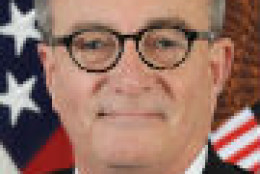Defense Department
-
Friday is the last day of service for Sergeant Major of the Army Ray Chandler. He will retire as the top enlisted man in the Army after nearly 34 years of service. He's the 14th Sergeant Major, and his main job is advisor to Army Chief of Staff General Ray Odierno. On In Depth with Francis Rose, he shared what thoughts are top-of-mind for him as he prepares to wind down his service.
January 28, 2015 -
Contrary to what you may have heard earlier in the week, Sgt. Bowe Bergdahl has not been charged with desertion. Bergdahl left his post in Afghanistan and was held prisoner by the Taliban for five years. He was returned to the United States in a prisoner exchange last May. Multiple media outlets reported desertion charges had been handed down or were impending. But the Army said no decision has been made. Brian Bouffard is a military defense attorney and former JAG. He joined Tom Temin on the Federal Drive to speculate on what happens next.
January 28, 2015 -
The Pentagon led the way for the rest of the government by implementing two-factor authentication across many of its systems. But plenty of important IT infrastructure still relies on a "reckless" system that depends on passwords alone for authentication.
January 28, 2015 -
By ANDREW TAYLOR Associated Press WASHINGTON (AP) — President Barack Obama will ask Congress for a hefty, almost 8 percent boost for the Pentagon, including $5.3 billion to equip and train Iraqi soldiers and moderate…
January 28, 2015 -
Mark Orndorff, risk management executive & chief information officer for the Defense Information Systems Agency, joins Federal News Radio for a free online chat to discuss his agency's new risk management organization and DoD's evolving approach to cybersecurity.
January 27, 2015 -
Military leaders up to and including the chairman of the Joint Chiefs of Staff say cyber attacks by a sophisticated nation state are near the top of the list of things they worry about. From that point of view, a new Pentagon report has to make them worry a bit more. It finds that far too many of DoD's own networks aren't up to the challenge of defending against amateur cyber attackers. On In Depth with Francis Rose, Federal News Radio DoD Reporter Jared Serbu talks about it as part of this week's edition of Inside the Reporter's Notebook.
January 23, 2015 -
Michael Vickers, the undersecretary of Defense for intelligence, said cybersecurity and terrorism are his top two short- and long-term concerns. He said protecting space-based systems is becoming more important than ever. Vickers also wants to continue to transform the military intelligence community to meet ever-changing threats.
January 22, 2015 -
Almost all the pieces are in place to move some meaningful defense acquisition reform. Sen. John McCain (R-Ariz.) and Rep. Mac Thornberry (R-Texas) are the new chairmen of the Armed Services committees in Congress, and they both have a body of work in that subject. Deputy Defense Secretary Robert Work and Under Secretary of Defense for Acquisition, Technology and Logistics, Frank Kendall, are on board with an acquisition overhaul. And the likely nomination of Ash Carter as the new Defense Secretary puts the man behind the Better Buying Power concept at the top job of the Pentagon. Alex Ward is assistant director of the Brent Scowcroft Center on International Security at the Atlantic Council. He's also my guest for Pentagon Solutions today. On In Depth with Francis Rose, he said the anticipation for reform is mostly just hype.
January 21, 2015 -
A collection of new House bills aim to slash the federal workforce, let go of 120,000 civilian employees at the Pentagon and take back top secret security clearances for contractors in the intelligence community.
January 21, 2015 -
Despite bipartisan support and years of experience in the Defense Department, Ash Carter's confirmation hearing to be Defense secretary might not be smooth sailing.
January 21, 2015 -
Hearings on the nomination of Ashton Carter to be the next Defense Secretary will get underway next month. They'll be much more than a discussion of Carter's qualifications. The 2016 budget proposal will also be out then, so the hearings will likely cover wider ground. So will it be smooth sailing for President Barack Obama's nominee, or a bumpy road? Defense analyst Nora Bensahel, a distinguished scholar-in-residence at American University, joined Tom Temin on the Federal Drive to offer some insight.
January 21, 2015 -
Rep. Mac Thornberry (R-Texas), incoming chairman of the House Armed Services Committee, says defense acquisition reform is an essential element of his agenda. But the approach will be slow and steady.
January 21, 2015 -
Dr. Jack Midgely, director with Deloitte Tohmatsu Consulting in Tokyo, discusses defense priorities and security challenges in the Asia-Pacific region. January 20, 2015
January 20, 2015 -
The new chairman of the House Armed Services Committee says defense procurement reform is near the top of his agenda for the new Congress -- but don't expect things to change overnight. Federal News Radio DoD Reporter Jared Serbu says it's likely to be a multi-year affair.
January 20, 2015 -
A lead Inspector General will now keep tabs on the fight against the Islamic State group. That means oversight of programs from the Defense Department, State Department and the U.S. Agency for International Development. The new IG is Jon Rymer. He's the current DoD Inspector General. He joined the Federal Drive with Tom Temin to explain why a separate IG was needed to oversee Operation Inherent Resolve.
January 20, 2015









